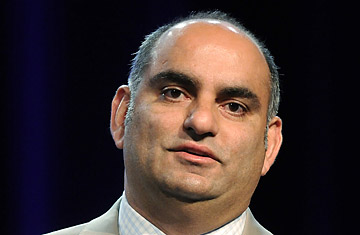
Mohnish Pabrai, managing partner with Pabrai Investment Funds, speaks during the Value Investing Congress in New York, on October 13, 2010.
(2 of 2)
Jason Saul, CEO of Mission Measurement (a consulting firm that measures social impact), says The Dakshana Foundation is part of a new swell of philanthropies. "People are giving in ways that are more market-based, more sustainable and more consistent with their world view," he says, citing the Skoll Foundation and Kiva as examples. "This generation doesn't want to just give to charity, they want to solve social problems and see results — and know that their solutions are sustainable."
Dakshana's results thus far have been easy to measure (mostly because Pabrai mandates complete and public transparency of his organization). Since 2007, 276 Dakshana scholars out of 713 (38%) have been successfully admitted into the IITs. By 2020, Pabrai says he hopes his schools will account for 10% of the Institutes' 20,000 freshmen.
This May, the first handful of Dakshana scholars will be graduating from the IITs and other Indian universities. One of these, Shashank Dubey, contacted Dakshana after he, his mother and his aunt left an IIT testing site in tears after they were turned away in 2007 (they had gone there to beg the testers to allow the boy to take the test for free.) A top student, but desperately poor after his street vendor father had passed away, he easily passed Dakshana's entrance exam. Dubey has since has gone on to Maharashtra Institute of Technology, a top-50 engineering school in India, where he has majored in petroleum engineering. He did an internship with Halliburton in Malaysia last summer (arranged by Dakshana's CEO) and when he graduates, he has a job with Cognizant Technology Solutions. "It's because of Dakshana my dream came true," he says now, with great emotion in his voice. "I'm deeply indebted to it and will try my level best to return to Dakshana until my last breathe."
And this is the crux of what Pabrai is hoping to instill in his scholars — and banking on for the future of Dakshana: future wealth recycling. At one point, Dakshana scholars were gently asked to give 10% of their upcoming earnings back to Dakshana. "I think the Dakshana approach strikes me as being very hands on, more engaged and very focused which is not unheard of but it's also not the norm in philanthropy," says Lucy Bernholz, the managing director at Arabella Philanthropic Investment Advisors and a visiting scholar at the Stanford University Center on Philanthropy and Civil Society. "But there is interesting idea here that is not common — the idea that young people who earn great wealth would pay back some earnings into the foundation. There is a lot to be said for over time building intellectual capacity and economic viability — building from the beginning a sense of knowing who helped you get there."
Pabrai, however, insists this is a mere suggestion that will more likely evolve into nothing more than a "nudge" down the road to some of the wealthier graduates. And Dakshana's CEO Colonel Sharma says he simply wants his scholars to become good citizens. "We say, 'If you help your own brothers and sisters and family and town, we will be very happy.'" Pabrai is more interested in encouraging others to steal his idea. "Humans don't appreciate the power of cloning," he says with a laugh, explaining that he cobbled together the idea of Dakshana himself by studying many other philanthropies and approaches. "I think a lot of people are getting more serious about how to do the most good, but there is no road map. I'm hoping I can offer an example."
For now, though, he's content with offering a new life to needy students who are willing to work hard. As Poonam Narain wrote in her Dakshana application essay in 2009: "I am very thankful to Dakshana as it has given this golden chance to poor children to fulfill their ambition. These poor children that can't afford to go on to further study are unable to do anything in the future. Dakshana has given us an opportunity to come forward to prove our hidden talent. In this world nothing is possible without money, the money which God has denied us." Thanks to her Dakshana scholarship, Narain is now a full-time computer science major at IIT-Roorkee with a summer internship at Deloitte.
